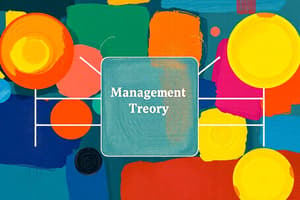Podcast
Questions and Answers
What is the first step in the planning process for managers?
What is the first step in the planning process for managers?
- Decide what strategies to adopt
- Decide how to allocate resources
- Evaluate how well an organization is achieving its goals
- Decide which goals the organization will pursue (correct)
Which task of management focuses on structuring working relationships?
Which task of management focuses on structuring working relationships?
- Organizing (correct)
- Planning
- Controlling
- Leading
What does the controlling function of management primarily involve?
What does the controlling function of management primarily involve?
- Allocating resources
- Setting performance standards (correct)
- Developing organizational goals
- Articulating a clear vision
Which of the following best describes the leading function of management?
Which of the following best describes the leading function of management?
What is an outcome of the control process in management?
What is an outcome of the control process in management?
Which step involves identifying appropriate organizational goals?
Which step involves identifying appropriate organizational goals?
The ability to motivate organizational members falls under which management task?
The ability to motivate organizational members falls under which management task?
What is essential for effective organizing in a management context?
What is essential for effective organizing in a management context?
What is the primary function of management?
What is the primary function of management?
Which of the following best describes organizational performance?
Which of the following best describes organizational performance?
What is a key aspect of effective management?
What is a key aspect of effective management?
What is NOT considered a resource in management?
What is NOT considered a resource in management?
How does efficiency in management relate to goals?
How does efficiency in management relate to goals?
What role does a manager primarily play in an organization?
What role does a manager primarily play in an organization?
Which management perspective emphasizes human behavior?
Which management perspective emphasizes human behavior?
Why is it important to study management principles?
Why is it important to study management principles?
What is the primary responsibility of top managers?
What is the primary responsibility of top managers?
Which of the following roles involves delivering a speech to inform the community about organizational intentions?
Which of the following roles involves delivering a speech to inform the community about organizational intentions?
Human skills in management primarily refer to which of the following abilities?
Human skills in management primarily refer to which of the following abilities?
What characterizes the monitor role in managerial responsibilities?
What characterizes the monitor role in managerial responsibilities?
Which managerial skill involves the ability to discuss and resolve interpersonal issues within a team?
Which managerial skill involves the ability to discuss and resolve interpersonal issues within a team?
What is the main function of middle managers in an organization?
What is the main function of middle managers in an organization?
Which type of skill involves the understanding of specific tasks and techniques needed for a job?
Which type of skill involves the understanding of specific tasks and techniques needed for a job?
What represents a core competency for an organization?
What represents a core competency for an organization?
What role is associated with committing organizational resources to develop innovative goods and services?
What role is associated with committing organizational resources to develop innovative goods and services?
Which role is primarily responsible for handling unexpected problems within the organization?
Which role is primarily responsible for handling unexpected problems within the organization?
What is the main task of a Resource Allocator?
What is the main task of a Resource Allocator?
Which role involves negotiating agreements about quality and price with suppliers and labor unions?
Which role involves negotiating agreements about quality and price with suppliers and labor unions?
What activity is associated with the Figurehead role?
What activity is associated with the Figurehead role?
Which of the following best describes the Leader role?
Which of the following best describes the Leader role?
What task is the Liaison role responsible for?
What task is the Liaison role responsible for?
Which role would involve outlining future goals and ethical guidelines during meetings?
Which role would involve outlining future goals and ethical guidelines during meetings?
What is the principle of division of labor focused on?
What is the principle of division of labor focused on?
Which principle states that an employee should receive orders from only one superior?
Which principle states that an employee should receive orders from only one superior?
What does the principle of equity emphasize within an organization?
What does the principle of equity emphasize within an organization?
What is the purpose of the principle of esprit de corps?
What is the purpose of the principle of esprit de corps?
The subordination of individual interests to the common interest means employees should:
The subordination of individual interests to the common interest means employees should:
Centralization refers to:
Centralization refers to:
Which principle ensures employees are encouraged to be innovative and creative?
Which principle ensures employees are encouraged to be innovative and creative?
What does the remuneration of personnel principle focus on?
What does the remuneration of personnel principle focus on?
What is a key task for managers according to the described work setting?
What is a key task for managers according to the described work setting?
What does Theory X assume about employees?
What does Theory X assume about employees?
What is the primary focus of organizational behavior?
What is the primary focus of organizational behavior?
Which approach encourages supervision and control of employees?
Which approach encourages supervision and control of employees?
What assumption does Theory Y make about employees?
What assumption does Theory Y make about employees?
What is a characteristic of informal organization?
What is a characteristic of informal organization?
In a successful work environment, what is most important for employee motivation?
In a successful work environment, what is most important for employee motivation?
What is a major difference between Theory X and Theory Y in management?
What is a major difference between Theory X and Theory Y in management?
Flashcards
Planning
Planning
The process of setting goals, developing strategies, and allocating resources to achieve those goals.
Organizing
Organizing
The process of structuring working relationships so that organizational members can interact and cooperate effectively to achieve organizational goals.
Leading
Leading
The process of influencing, motivating, and enabling organizational members to work together to achieve organizational goals.
Controlling
Controlling
Signup and view all the flashcards
Organizations
Organizations
Signup and view all the flashcards
Managers
Managers
Signup and view all the flashcards
Management
Management
Signup and view all the flashcards
Organizational Performance
Organizational Performance
Signup and view all the flashcards
Efficiency
Efficiency
Signup and view all the flashcards
Effectiveness
Effectiveness
Signup and view all the flashcards
Why Study Management?
Why Study Management?
Signup and view all the flashcards
Why Study Management?
Why Study Management?
Signup and view all the flashcards
Entrepreneur (Decisional Role)
Entrepreneur (Decisional Role)
Signup and view all the flashcards
Disturbance Handler (Decisional Role)
Disturbance Handler (Decisional Role)
Signup and view all the flashcards
Resource Allocator (Decisional Role)
Resource Allocator (Decisional Role)
Signup and view all the flashcards
Negotiator (Decisional Role)
Negotiator (Decisional Role)
Signup and view all the flashcards
Figurehead (Interpersonal Role)
Figurehead (Interpersonal Role)
Signup and view all the flashcards
Leader (Interpersonal Role)
Leader (Interpersonal Role)
Signup and view all the flashcards
Liaison (Interpersonal Role)
Liaison (Interpersonal Role)
Signup and view all the flashcards
Informational Role
Informational Role
Signup and view all the flashcards
Monitor
Monitor
Signup and view all the flashcards
Disseminator
Disseminator
Signup and view all the flashcards
Spokesperson
Spokesperson
Signup and view all the flashcards
Top Managers
Top Managers
Signup and view all the flashcards
Middle Managers
Middle Managers
Signup and view all the flashcards
First-Line Managers
First-Line Managers
Signup and view all the flashcards
Human Skills
Human Skills
Signup and view all the flashcards
Organizational Behavior
Organizational Behavior
Signup and view all the flashcards
Informal Organization
Informal Organization
Signup and view all the flashcards
Theory X
Theory X
Signup and view all the flashcards
Theory Y
Theory Y
Signup and view all the flashcards
Norms
Norms
Signup and view all the flashcards
Division of Labor
Division of Labor
Signup and view all the flashcards
Authority and Responsibility
Authority and Responsibility
Signup and view all the flashcards
Unity of Command
Unity of Command
Signup and view all the flashcards
Line of Authority
Line of Authority
Signup and view all the flashcards
Centralization
Centralization
Signup and view all the flashcards
Unity of Direction
Unity of Direction
Signup and view all the flashcards
Equity
Equity
Signup and view all the flashcards
Study Notes
Introduction to Management/Management Theory
- Management is the coordination of people and resources to meet goals effectively and efficiently
- Organizations are collections of people who work together to achieve goals
- Managers are responsible for supervising resource use to meet organizational goals
- Management includes planning, organizing, leading, and controlling human and other resources
What is Management?
- Organizations are collections of people who work together to achieve goals.
- Managers are responsible for supervising the use of an organization's resources to meet its goals.
- Management involves planning, organizing, leading, and controlling human and other resources to accomplish organizational goals efficiently and effectively.
- Resources include: people and their skills, machinery, raw materials, financial capital, computers, and information technology, and loyal employees and customers.
Achieving High Performance: A Manager's Goal
- Organizational performance is a measure of how effectively and efficiently managers use available resources to meet customer needs and achieve organizational goals.
- Efficiency is the measure of how well resources are used to achieve a goal.
- Effectiveness is a measure of the appropriateness of the goals an organization is pursuing and the degree to which the organization achieves those goals.
- High-performing organizations are both efficient and effective.
Why Study Management?
- Individuals learn through personal experiences and the experiences of others.
- The economic benefits of being a good manager are impressive.
- Learning management principles helps make better decisions in non-work contexts.
Figure 1.2 Four Tasks of Management
- Controlling: Establish accurate monitoring systems to evaluate how well organizational goals are met.
- Planning: Choose appropriate organizational goals and courses of action to achieve goals.
- Organizing: Establish task and authority relationships so people can work together to achieve organizational goals.
- Leading: Motivate, coordinate, and energize individuals and groups to achieve organizational goals.
Managerial Roles
- Decisional Roles: Entrepreneur (develop new ideas), Disturbance handler (solving unexpected problems), Resource allocator (allocating resources), Negotiator (working with others to reach agreements).
- Interpersonal Roles Figurehead (symbolic head), Leader (motivating and guiding employees), Liaison (linking and coordinating with others).
- Informational Roles: Monitor (monitoring external/internal environments), Disseminator (sharing information with others), Spokesperson (representing the organization to outsiders).
Levels and Skills of Managers
- Top managers are responsible for all departments, setting organizational goals.
- Middle managers are responsible for finding the best way to use resources to meet organizational goals.
- First-line managers (supervisors) supervise non-managerial employees and oversee daily tasks.
- Different levels of management focus on varying combinations of planning, organizing, leading, and controlling.
Types of Managerial Skills
- Conceptual Skills: Analyze and diagnose situations and distinguish cause and effect.
- Human Skills: Ability to understand, lead, and control the behaviors of individuals and groups.
- Technical Skills: Job-specific knowledge and techniques to perform organizational roles.
- Skill intensity varies across management levels, with top managers needing more conceptual skills and front-line managers more technical skills.
Core Competency
- Specific set of departmental skills, knowledge, and experience that allows an organization to outperform competitors.
- Dell's materials management produced PCs at a lower cost than competitors.
Recent Changes in Management Practices
- Restructuring: Downsizing by eliminating jobs of managers and employees.
- Outsourcing: Contracting with another company to perform work previously done internally.
Empowerment and Self-Managed Teams
- Empowerment: Giving employees more authority and responsibility over how they perform their work activities.
- Self-managed teams: Groups of employees who are collectively responsible for organizing, supervising, and controlling their own work.
Challenges for Management in a Global Environment
- Build a competitive advantage
- Maintaining ethical and socially responsible standards.
- Manage a diverse workforce.
- Utilize new technologies effectively.
- Practice global crisis management.
Evolution of Management Theory
- Different theories emerged and evolved over time, each contributing to the field of management.
Scientific Management Theory (F.W. Taylor and The Gilbreths)
- Systematic study of relationship between people and tasks to increase efficiency.
- Analyzing tasks, improving methods, selecting and training workers, and motivating workers with appropriate pay.
Administrative Management Theory (Max Weber and Fayol)
- Establishing formal structures, rules, and procedures in organizations for efficiency and effectiveness.
- Principles include authority, responsibility, unity of command, line of authority, centralization, unity of direction, equity, order, and discipline.
Behavioral Management Theory (Mary Parker Follett, The Hawthorne Studies)
- Focuses on the human aspects of work, recognizing the impact of motivation and social interactions on worker performance.
- Importance of social dynamics and management styles on work group behavior and individual performance.
- Importance of informal organization.
Theory X and Theory Y(Douglas McGregor)
- Theory X describes workers as inherently lazy and needing close supervision to work, and Theory Y holds the opposite belief.
Management Science Theory
- Focuses on quantitative methods to make maximum use of organizational resources.
- Includes techniques like linear programming, modeling, simulation and operations management.
Contingency Theory
- Recognizes that the best organizational structure and control systems depend on external environment conditions.
- There is no one best way to organize, depending on the situation.
Organizational Environment Theory
- The set of forces and conditions that operate beyond an organization’s boundaries influencing its ability to acquire and utilize resources.
The Open-Systems View
- Organizations are open systems interacting with their environment.
- Inputs (resources) are transformed into outputs (goods and services) through a conversion process, which is influenced by elements of the environment.
Types of Organizational Structure
- Mechanistic structure: Centralized, specific tasks, and close supervision (stable environment). Examples are McDonald’s.
- Organic structure: Decentralized, ambiguous tasks, and cooperative team effort (changing environment). Examples are Google and Apple.
Dynamic Capabilities
- Build, integrate, and reconfigure processes to adapt to rapidly changing internal and external environments.
- Organizations need unique capabilities to sense opportunities, seize value, and adapt and transform effectively.
Studying That Suits You
Use AI to generate personalized quizzes and flashcards to suit your learning preferences.




